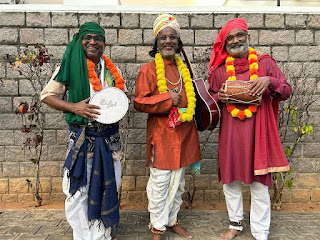Chilkuri Vasanth Rao was the main performer with his
brothers Chilkuri Shyam Rao and Chilkuri Sushil Rao being co-performers.
It was in 1978 that the first performance was given by the folk
artistes. The story of ‘Samson and Delilah’ was performed at more than 60
places during the initial years itself. The places include apart from several
places in Hyderabad, at Medak, Sangareddy, Nalgonda, Kamareddy, Yellareddyguda,
Vizag, Vizianagaram, Kakinada.
“Recollecting the entire story was not so easy but once we
got into the narration, the sequence of story fell in line,” Chilkuri Vasanth
Rao said. During the early years of their performance, the Chilkuri Burrakatha
Brundham received encouragement from the well-known Surabhi Theatre Group which
used to provide costumes to the troupe.
The stories that were narrated through the folk art include
the story of ‘Nehemiah’ also from the Bible. The performances used to be mainly
given during ‘jatharas’ churches used to hold on special occasions.
Chilkuri Vasanth Rao holds a Ph D from Germany and is
currently Principal of United Theological College, Bengaluru. His elder brother
Chilkuri Shyam Rao is a leading advocate in Hyderabad and his younger brother Chilkuri
Sushil Rao is a filmmaker and mediaperson.
While the three brothers have performed and recorded several
Telangana Christian folk songs over the years, the Burrakatha performance was
given after a long gap, mostly recollecting from memory what used to be
performed more than 40 years ago.







Comments
Post a Comment